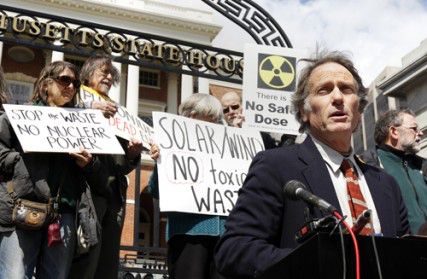
Bostonians demanded better nuclear safety and a halt to the relicensing of nuclear power plants on the front steps of the State House on Wednesday.
The rally focused on the dangers of nuclear power, which most speakers agreed were not worth taking in light of the Fukushima disaster in Japan after the March earthquake, and the need to invest more resources into safe and renewable energy.
Cindy Luppi, the New England co-director from Clean Water Action and Brian Wright, an advocate of Environment Massachusetts, helped organize the rally.
The first speaker, Rep. Lori Ehrlich of Marblehead, recounted her visit to the Chernobyl disaster site in 1992.
“I have seen with my own eyes what an alienation zone looks like. It’s just unthinkable to me to overlay that desolation anywhere in our state,” Ehlrich said.
Ehlrich said that Germany was in the process of closing seven of its nuclear power plants.
“We are losing the opportunity to lead. We can do better, we must do better. It is time for good old American innovation to kick in,” she said.
Rep. Denise Provost of Somerville shared her concerns as well.
“Nuclear power is just not safe, and not worth the risk,” Provost said.
Mary Lampert a representative of Pilgrim Watch, an organization which focuses on keeping Pilgrim power plant closed until safety concerns are met, also spoke.
The Pilgrim power plant is ranked second in the nation in risking a disaster due to a possible earthquake, according to a study by the Nuclear Regulatory Commission.
Lampert said that the Fukushima power plant disaster occurred because of the loss of electrical power, which prevented the nuclear power plant from functioning properly.
The cables supplying energy to the Pilgrim power plant were also old, she said.
“You do not need an earthquake or a tsunami to lose power,” she said.
Chris Nuard, representing the C-10 organization, a group which envisions “a clean, safe, sustainable energy future” according to its website, urged Gov. Deval Patrick to lead the movement by closing power plants and using safer renewable energy.
Paul Blanch, a nuclear energy expert stressed that before the United States can use nuclear power, better safety regulations need to be enacted by the NRC.
“We must have regulations that will enforce or minimize the effects of a disaster like Fukushima,” he said.
Dr. Jill Stein, a former Massachusetts governor’s race candidate and a representative of Physicians for Social Responsibility, discussed the health issues relating to nuclear power.
“We know that any number of exposures is not safe,” Stein said.
Marcia Hnatowich of Brookline, who attended the rally, expressed one of the primary concerns held by many who attended in respect to nuclear power plants.
“What I am alarmed about is just the danger of having them” Hnatowich said.
James Baldwin, a visiting professor in the department of geography and environment at Boston University, acknowledged the risks of nuclear safety.
“Until we can demonstrate an ability to safely shutdown plants in distress and safely store the waste products, the decision to either use or abandon nuclear power needs to be actively up for public debate,” Baldwin said.


















































































































